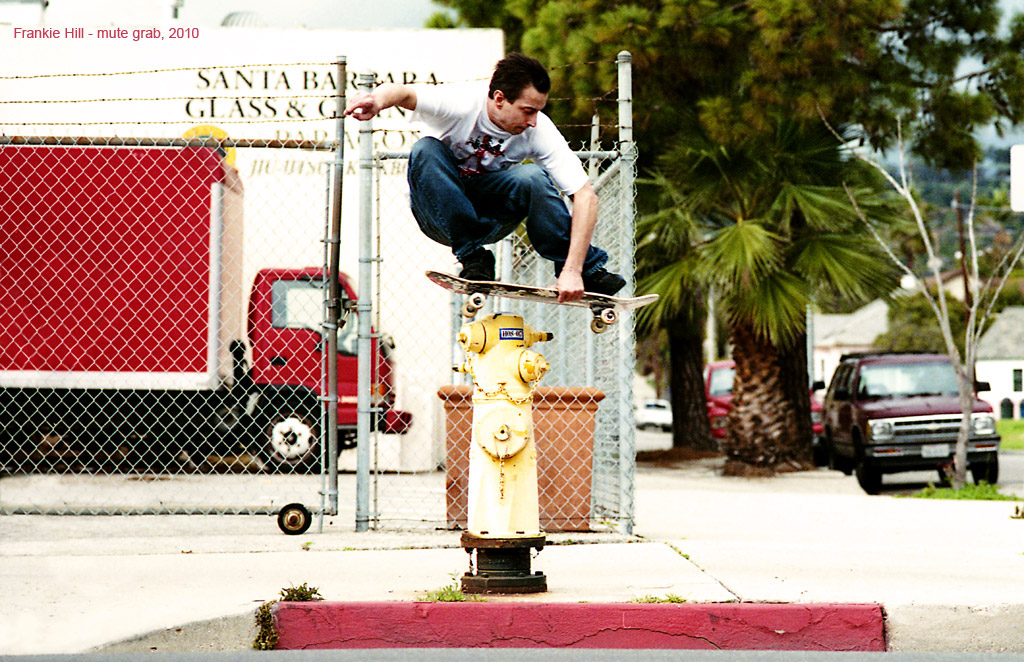Rebels in Their Day
Old-School Skateboarders Have Mixed Feelings About Sport’s Olympic Debut

Several Olympic athletes have come out of Dos Pueblos High School — Doug Partie in men’s volleyball (1988 and ’92); Chris Segesman in men’s water polo (2004); Kiley Neushul, Sami Hill (2016), and Jamie Neushul (2021) in women’s water polo; and Stamatia Scarvelis, representing Greece, in the women’s hammer throw (2021).
DP graduates Frankie Hill (Class of ’90) and Mike Santarossa (’93) had the dedication and skills that might have put them into the Olympics, if their activity had received the recognition it does today. They were skateboarders.
Skateboarding has made its debut as an Olympic sport in Tokyo, part of a push by the powers-that-be to modernize the Games. During NBC’s featured telecasts of last week’s street competition, the athletes were leaping and grinding their boards down handrails over flights of stairs — something Hill was doing three decades ago on rails at the DP campus and UCSB.

“I was trying to find the one thing I could do that no one else could,” said Hill. “I went down 14 stairs when nobody else did 10.”
Hill said, “I’m very proud and happy it’s evolved to become a big sport, but I feel a little sad that skaters today can’t have that feeling of originality. It was all about being different. I used to get clothes out of the free box in Isla Vista and dress up in really bizarre getups.”
The rebel mindset that prevailed among skateboarders of their era conjures mixed emotions about joining the Olympic mainstream.
“We were outcasts,” Santarossa said. “I was one of four or five kids that rode skateboards in high school. Purists don’t see skateboarding as a sport but as an artistic lifestyle, a creative outlet. But there’s always been a competitive aspect.”
Hill and Santarossa both were sponsored by Santa Barbara–based Powell Peralta Skateboards. “I was the first skateboarder to go pro just for making videos,” Hill said. “I always got nervous in contests, and Powell took me out of them.” Santarossa performed on tours in Europe, Japan, and Australia. But as waves of younger practitioners arrived on the scene, Santarossa said, “I couldn’t see continuing to throw myself down the hill.”
Hill, 50, lives in Ventura and said he still hops on his skateboard a few times a month. Santarossa, 46, has returned to the sport in a fulfilling way. The Goleta resident started giving lessons to youngsters and founded the Triumph Skateboarding Club.
“When I help a kid get over the fear of dropping in a quarter-pipe, the joy I see is better than I felt doing my own,” he said. The kids can now harbor Olympic dreams, but that’s not Santarossa’s selling point. “If you’re doing it to get into the Olympics, it’s the wrong reason,” he said. “Skateboarding is about fun. [U.S. star] Nyjah Huston works hard, but he loves skateboarding because it’s fun to him.”
Huston tried some nearly impossible tricks in the Tokyo street competition and finished out of the medals. Japan’s amazing Yuto Horigome was the winner, America’s Jagger Eaton took the bronze, and all of the competitors seemed to be enjoying themselves.
“The enthusiasm of young skateboarders is pretty contagious,” observed Jim Fitzpatrick, a longtime skateboarding promoter who was a vice president of USA Skateboarding. “It’s as if they’re collaborating rather than competing.”


KEEP IT ROLLING: Former skateboarding pro Mike Santarossa teaches the tricks of the trade to youngsters such as 8-year-old Decker Etherton. | Credit: John Zant
Skateboarders had to overcome their own reluctance to become part of the Olympics, Fitzpatrick said. “It’s the epitome of an organized event. [Legendary skater] Tony Alva said, ‘The Olympics need skateboarding more than we need the Olympics.’”
A more significant development is the proliferation of public skate parks. There are more than 4,000 such installations in the country, Fitzpatrick said, including Santa Barbara’s and Goleta’s. Leaders of the Carpinteria Skate Foundation are currently raising funds to build a skate park that has been approved for their community.
DOWN TO THE WIRE: Santa Barbara’s three-time Olympic volleyball champion Karch Kiraly has been on a mission to bring the U.S. women’s indoor team its first gold medal. It’s boom or bust this week at Tokyo. Despite losing two starters to injury, Kiraly coached the women to a comeback victory over Italy to finish at the top of their group. They need to get through two more matches to play for the gold in one of the final Olympic events at 9:30 p.m. Saturday (Pacific Time).
In water polo, the U.S. women hope to play for their third consecutive gold medal on Friday night. After suffering a rare loss to Hungary in group play, they thrashed the ROC (Russian Olympic Committee) 18-5, with Santa Barbara’s Paige Hauschild and Jamie Neushul both scoring goals.
FORESTERS ON FIRE: After a midseason slump, the Santa Barbara Foresters finished the regular season on a 16-game winning streak. The defending National Baseball Congress champions take a 31-7 overall record to the 87th NBC World Series in Kansas this week.
Support the Santa Barbara Independent through a long-term or a single contribution.




You must be logged in to post a comment.